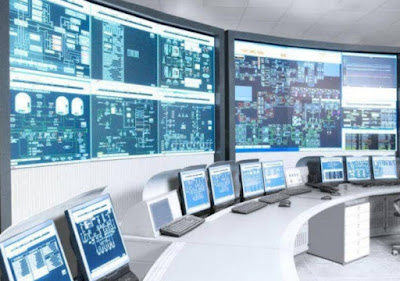distributed Control System (DCS)
Distributed Control System (DCS)
What is a Distributed Control System ?
A distributed control system, also known as DSC, is a computer control system for a process plant, typically with multiple control loops, in which autonomous controllers are distributed throughout the system. A distributed control system integrates the PLC and the process controller of the process line into a coordinated, interactive system.
Distributed Control System (DSC) Architecture
Block Diagram
Level 0 : Field Level
This layer includes the basic field devices like sensors, transmitters etc. Field level components are directly linked to the process.
Level 1 : Direct Process Control
This level handles various functions as
- Data Acquisition
- Data Check
- Plant Monitoring
- Open and Closed loop Control
- Reporting
Level 2 : Plant Supervisory Control
This level handles various functions as
- Plant Performance Monitoring
- Plant Coordination
- Optimal Process Control
- Adaptive Control
- Failure Detections
Level 3 : Production Scheduling And Control
This level handles various functions as
- Production Dispatching
- Inventory Control
- Production Supervision
- Production Re-Scheduling
- Production Reporting
Level 4 : Plant Management
This level handles various functions as
- Market and Customer Analysis
- Orders And Sales Statistics
- Capacity and Order Balance
- Order Dispatching
- Production Planning
- Terms Supervision
- Financial Surveys
Database Management
Level of database management
Level 1- Database of Process Control level
Level 2-Plant Database
Level 3- Production Database
Level 4- Management Database
Functions of DCS
- I/O signal characterization
- Signal filtering
- Alarming I/O modules
- Ranging and engineering units
- Control logic
- Control interlocks
- Sequencing
- Batch control
- Passing on trending information
- Passing on report information
Advantages
- The system can be implemented in a modular manner allowing for easy system growth as each processor has a clearly defined set of functions; If designed carefully.
- DCS is less overloading system
- DCS does not affect the entire system in case of any failure in any part
- Backup i.e. redundancy feature possible in DCS.
- DCS has higher reliability than centralized control.
- DCS uses fewer wires for control purposes, thus reducing the cost of computer interfacing
- DCS is more flexible in terms of changing the configuration of a particular range to meet changing requirements.
- Duplicate storage of critical data can be easily done.
Limitations
- Cost is higher
- Specialized support from engineering personnel required.
- DCS requires a clean control room environment.



.jpg)
Comments
Post a Comment